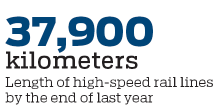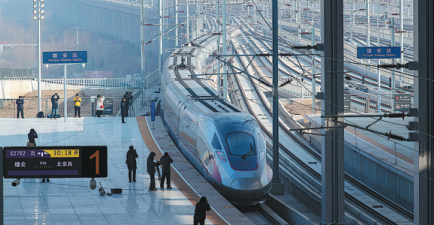High-speed rail travelers relish convenience of ever-growing network

Shao Fang, a nanny from Zhumadian, Henan province, takes a bullet train between the nation's capital and her hometown every two months. The four-hour trip allows her to visit home every other month "to earn more money in Beijing and also see my sons frequently".
That is a stark contrast from 18 years ago, when she worked as a migrant worker in Shenzhen, Guangdong province. Back then, she visited home once a year because the railway trips took two days, and tickets were always in short supply.
Now, travelers can easily reserve seats via mobile phones and the internet, a departure from past scenes of people lining up at railway stations overnight to get a ticket.
Slow, cramped trains are no longer the only option for train travelers. The development of the nation's high-speed railway network has made travel more comfortable and convenient.
Since China opened it first high-speed railway in 2008-the Beijing-Tianjin Intercity Railway, with a designed speed of 350 kilometers per hour-the country has built the most extensive high-speed railway network in the world. By the end of 2015, it covered 19,800 km.
From 2016 to last year, the nation continued to expand the network, with the length of high-speed lines nearly doubling to 37,900 km and bullet trains handling 9 billion passenger trips.
By the end of last year, 95 percent of areas with populations of more than 1 million had access to the high-speed railway network.
China has completed a network of four main north-south high-speed railway lines and four east-west ones.
More than 10 new railway lines were put into operation last year, including a major line connecting Beijing and the Xiong'an New Area in Hebei province. Xiong'an has been dubbed the country's "city of the future".
Another high-speed line that opened last year connects Yinchuan, capital of the Ningxia Hui autonomous region, and Xi'an, capital of Shaanxi province, extending the high-speed railway network to Ningxia. All provincial-level regions on the Chinese mainland except the Tibet autonomous region now have access to high-speed trains.
The network will continue to expand. The country issued a guideline in 2016 to build a high-speed network of eight main north-south and eight east-west lines.
According to a recently released blueprint, by 2035, the high-speed railway network will be expanded to cover 70,000 km, reaching areas with populations of more than 500,000.
Lu Deyan, a hotel owner in a remote village in Hubei province, used to work in big cities as a migrant worker.
"In the past, I took slow trains to go out to work as a migrant worker. Now, tourists take bullet trains to visit my hometown," he said. "And I also take fancy bullet trains to go out for travel.
"All are benefiting from the more convenient transportation network."
A woman surnamed Ren from Chongqing in southwestern China was reluctant to move to Xi'an, Shaanxi province, seven years ago because she thought the transportation system was inconvenient.
After completing graduate school in Chongqing, Ren's then boyfriend found a decent job in Xi'an, but the distance created a dilemma for her.
As an only child, Ren thought about giving up on the relationship since she did not want to move far away from her parents.
After nearly two years of struggle, love won. She moved to Xi'an, married and started traveling monthly between the two cities.
"It used to take nearly 10 hours by train to travel between Chongqing and Xi'an," she said, adding that flights were expensive, and safety checks at airports extended travel time.
Life became easier for Ren with the opening of the Xi'an-Chengdu High-speed Railway at the end of 2017. Her travel time has been cut to about five hours by bullet train.
"I was longing for the opening of the high-speed railway, as were my mom and dad and my husband," she said.
Ren's daughter is now 6 years old, and she can speak both the Chongqing and Xi'an dialects. In fact, Ren considers both cities to be the girl's hometown.
Ren's parents travel to Xi'an frequently.
"In 2011, I could not even imagine how convenient it could be. Luckily, I made the right choice to maintain the relationship," she said.
"The convenient railway network keeps my family 'closer', geographically and mentally."
luowangshu@chinadaily.com.cn























